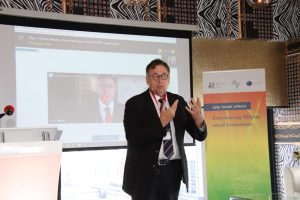

AT least 40 women and youth-owned businesses attended a three-day masterclass series aimed at equipping the African entrepreneurs with the skills, information and networks needed to expand their business using the African Continental Free Trade Area (AfCFTA).
The masterclass was organised by the International Trade Centre (ITC), AfCFTA Secretariat, United Nations Economic Commission for Africa (UNECA), the Organization of Women in International Trade (OWIT) and the Commercial Law Development Program (CLDP) through the Africa Women and Youth Empowerment Working Group (AWYEG), ahead of the AfCFTA Business Forum.

Head of ITC’s SME Trade Academy, Shaun Lake
Held ahead of the AfCFTA Business Forum in Cape Town, the three-day training Export and Investment Readiness under AfCFTA immersion programme is expected to assist a pipeline of viable and sustainable women and youth-owned businesses to tap into the AfCFTA market of 1.3 billion people.
These African business owners are critical drivers of the Agreement, and ensuring their inclusion in the implementation of the AfCFTA is essential to its success.
The masterclass was also geared to equip women and youth entrepreneurs to attract tailored finance, investment, and business linkages to meet the scale and standards of the continental market and take advantage of the AfCFTA Guided Trade Initiative.
“Access to investment and trade finance is a critical lever for empowering women- and youth-led businesses to seize new opportunities in exports, business, and regional value chains created through the AfCFTA. ECA’s session on Investment Readiness Under the AfCFTA is therefore focused on enhancing the capacity of women- and youth-led businesses in designing compelling business cases for investment. This will enable them to scale and meet the standards of the African market, while also creating business linkages that facilitate their participation in continental supply and value chains,” said Mie Joergensen, Junior Professional Officer, UNECA.
ITC provided a clear overview of opportunities presented by the AfCFTA and how to export under the Agreement, while the ECA oriented women and youth businesses towards attracting investment and business linkages.
The Head of ITC’s SME Trade Academy, Shaun Lake, highlighted ITC’s cooperate initiative dubbed ‘One Trade Africa’ is fully committed to empowering, enhancing and enabling African MSMEs, women and youth entrepreneurs to capitalise on the AfCFTA.
The Agreement will not yield the desired effects without targeted and tailored training for Africa’s business community.
By incorporating the modules from the ‘How to Export with the AfCFTA’ training program into the Masterclass Series, we are providing African businesses with the knowledge and skills necessary to advance intra-African trade.”
Given the vital importance of the AfCFTA, last year, ITC launched a new corporate initiative called “One Trade Africa”. It is designed to empower, enhance, and enable African MSMEs, women and youth entrepreneurs to fully capitalise on the AfCFTA.
Equally important was the OWIT-led session on developing a business case and practicing a pitch to potential investors, partners, and incubators. “OWIT’s session on developing a business case and perfecting a pitch equipped participants with skills and tools to confidently take on the next steps in growing their businesses. Equally important to having a great business idea is the ability to effectively communicate it to potential investors, partners and incubators,” describes Frida Owinga, President of OWIT.
The structure of the masterclass series was split into three parts: the ITC and Afreximbank online self-paced course on “How to Export with the AfCFTA” and two virtual immersion labs took place ahead of the final three-day training in Cape Town, South Africa. The masterclass series also aimed to bridge networking links between women and youth-led businesses and business stakeholders, including incubators and accelerators.